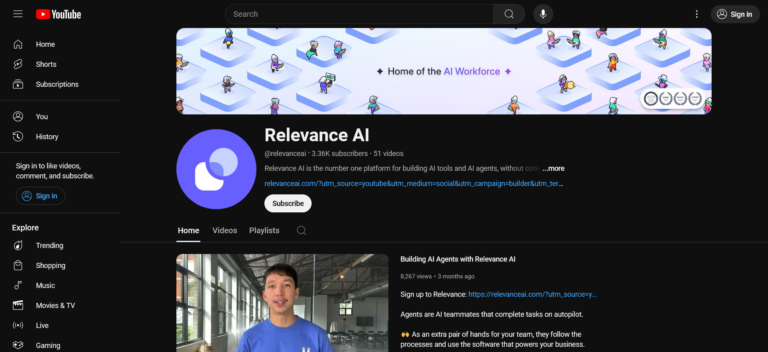Top Strategies for Building the Best AI Agents
Relevance.ai
Absolutely incredible! Relevance.ai’s Agents are a true game-changer for any team looking to automate workflows and enhance productivity. These AI teammates handle tasks on autopilot, becoming an extra pair of…
Key Take-aways
- Clear and Structured Prompts: AI agents require clear, well-structured prompts that are easy to follow. Ambiguity should be intentional, and prompts should avoid exhausting the AI’s short-term memory.
- Focus on One Task at a Time: AI agents struggle with handling multiple unrelated tasks simultaneously. Breaking tasks into separate, manageable steps improves performance and output consistency.
- Collaboration with Domain Experts: Domain expertise is crucial for building successful AI agents. Collaborating with domain experts ensures accurate, effective AI performance across specific fields.
Andrew, an AI Solutions Engineer at Relevance AI, shares his top tips for developing high-performing AI agents. With a background in software engineering and computer science, Andrew emphasizes the importance of clear prompts, task management, and domain expertise. This article explores his expert strategies for optimizing AI agent development.
Success Stories: Creating Effective AI Agents with Relevance AI
Andrew’s insights highlight best practices in building AI agents:
- Using Clear and Concise Prompts: AI agents operate best when given simple, well-organized instructions. Andrew explains that prompts should be written in plain English, broken into bullet points, and designed to minimize token usage, preventing memory overload.
- Example: When developing an AI content editor, prompts should clearly state the desired structure (e.g., “Restructure this paragraph using bullet points A, B, and C”), ensuring that the AI remains focused and consistent.
- Managing AI Tasks with Relevance AI: Relevance AI enables developers to break complex workflows into individual steps, allowing AI agents to handle one task at a time. This modular approach improves accuracy and prevents confusion.
- Example: Andrew used Relevance AI to create an agent that processes multiple documents in sequence. Each step focused on a specific task, such as summarization, keyword extraction, or sentiment analysis, leading to better results.
- Collaborating with Domain Experts: Domain experts provide crucial insights into the specific areas where AI agents operate. By working closely with domain experts, AI developers can identify potential issues, fine-tune AI behavior, and ensure more accurate outputs.
- Example: Andrew collaborated with legal experts to develop an AI legal assistant that could accurately interpret legal documents, identify clauses, and suggest edits based on domain-specific knowledge.
What Makes an AI Agent Effective? Key Features and Strategies
Creating effective AI agents involves a combination of clear prompts, task management, and expert collaboration. Here’s how each factor contributes to AI performance:
- Structured Prompts: Prompts are the foundation of AI agent behavior. They must be written in a way that humans can easily understand, with bullet points and clear instructions to ensure the AI can follow them correctly.
- Examples: Use structured prompts for tasks like text summarization, data extraction, or content rewriting, where clear guidance ensures consistent results.
- Single-Task Focus: AI agents should focus on one task at a time to avoid confusion and improve accuracy. When agents are given multiple tasks at once, performance can degrade, especially when tasks are unrelated.
- Examples: An AI writing assistant should focus solely on rewriting paragraphs before moving on to sentiment analysis or keyword extraction.
- Domain Expert Collaboration: Domain experts help refine AI behavior by providing industry-specific knowledge, identifying potential pitfalls, and ensuring the AI meets real-world requirements.
- Examples: In healthcare, domain experts guide AI agents to understand medical terminology and protocols, improving the agent’s accuracy in patient record management.
Best Practices for AI Agent Development: Insights from Relevance AI
Andrew outlines several best practices for building high-quality AI agents at Relevance AI:
- Prompts Should Be Clear and Simple:
- Structure Prompts Carefully: Prompts should be broken into bullet points or numbered steps, allowing AI agents to process instructions without confusion.
- Limit Token Usage: To prevent memory overload, prompts should be concise, using minimal tokens while still delivering clear instructions.
- Example from Relevance AI: Andrew developed a summarization agent that used clear bullet points to guide the summarization process, resulting in accurate outputs.
- Focus on Single Tasks:
- Break Tasks into Steps: AI agents should handle tasks sequentially, with each step focused on a specific task. This modular approach ensures that agents perform consistently across various tasks.
- Use Relevance AI’s Multi-Step Workflows: Relevance AI’s platform allows developers to create workflows with distinct steps, ensuring that agents handle one task at a time.
- Example from Relevance AI: A document processing agent at Relevance AI was designed to handle data extraction first, followed by sentiment analysis and keyword tagging, improving the accuracy of each step.
- Collaborate with Domain Experts:
- Leverage Expert Knowledge: Domain experts help AI developers understand industry-specific terminology, best practices, and potential challenges.
- Refine AI Behavior: Experts identify flaws in AI outputs, guiding developers to improve agent accuracy and reliability.
- Example from Relevance AI: In a finance-related project, Andrew worked with financial analysts to ensure that an AI agent could accurately categorize transactions, identify patterns, and provide insights based on domain knowledge.
Top Use Cases for AI Agents
AI agents can be used across various industries to enhance performance, improve efficiency, and deliver better results:
- Customer Support Automation: AI agents can handle customer inquiries, offer personalized responses, and escalate issues to human agents when needed.
- Content Generation and Editing: AI writing assistants can restructure paragraphs, suggest keywords, and edit content based on user inputs.
- Data Analysis and Reporting: AI agents can analyze large datasets, extract relevant insights, and generate detailed reports.
Analyzing Effective AI Agent Development
While building AI agents offers significant advantages, it also presents unique challenges:
- Clarity vs. Complexity: Balancing clear, concise prompts with complex instructions requires careful prompt engineering to ensure consistent results.
- Task Management: Breaking tasks into sequential steps is crucial for accuracy, especially in multi-step workflows.
- Expert Involvement: Domain experts play a vital role in refining AI behavior, ensuring that agents deliver accurate outputs across specific industries.
Monetization Strategies for AI Agents
Businesses can monetize AI agents through several approaches:
- Software as a Service (SaaS): Offer AI agents as part of a subscription-based service, providing regular updates and new features.
- Consulting Services: Provide customized AI solutions, leveraging domain expertise to tailor AI agents to specific industries.
- Training and Development Courses: Develop courses that teach users how to build, refine, and deploy AI agents effectively, integrating platforms like Relevance AI into workflows.
Is Building AI Agents Right for Your Business?
AI agents offer powerful solutions for automating tasks, personalizing user experiences, and analyzing data. By focusing on clear prompts, single-task management, and expert collaboration, businesses can create effective AI agents that deliver reliable results.
Relevance AI’s platform makes it easy to build, refine, and deploy AI agents across various industries. Whether you’re new to AI development or looking to enhance existing workflows, integrating AI agents can transform your approach to automation.
Ready to build effective AI agents? Discover how Relevance AI can help you create tailored, scalable solutions today.

